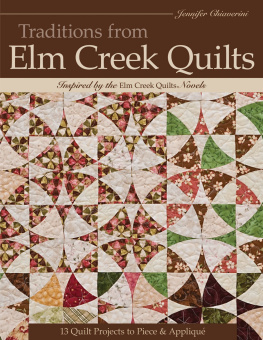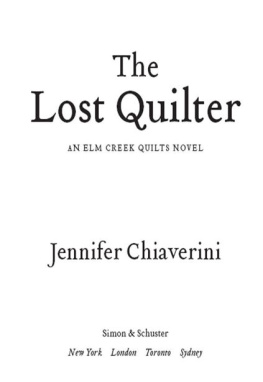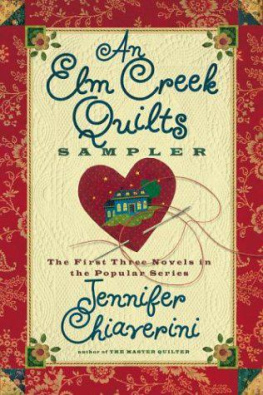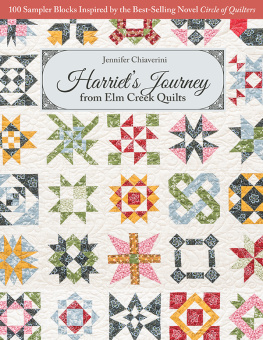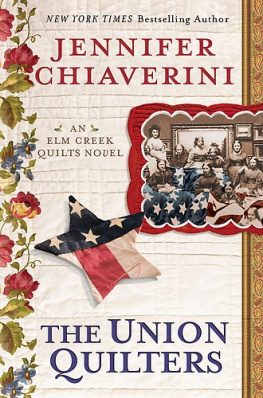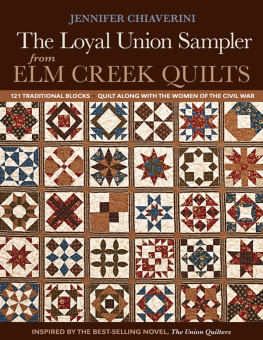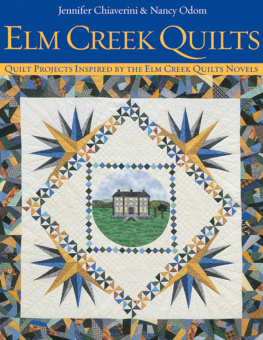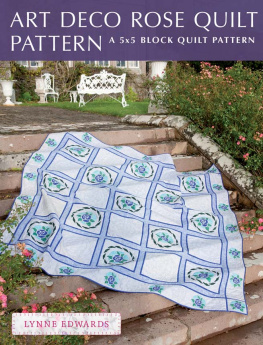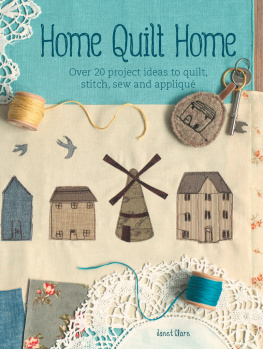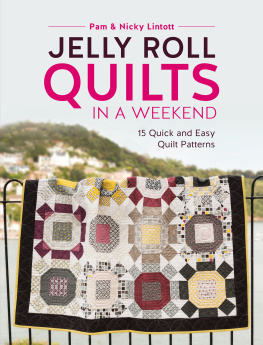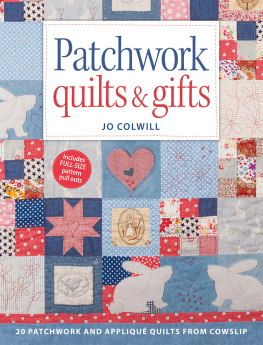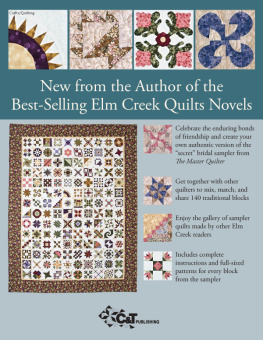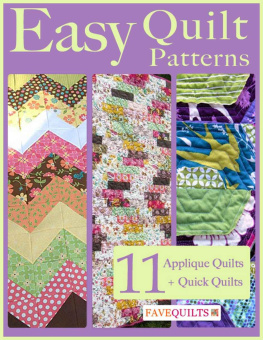Dedication
To my mother, Geraldine
Neidenbach; my sister, Heather
Neidenbach; and my friend
Sue Vollbrecht, who generously
lent their talents to the creation
of this book.

When I travel around the country on book tours, readers often ask me, Where do you get your ideas? Sometimes my fascination with a particular quilting style or a historical era inspires a new novel, but often a character, story line, or unanswered question from a previous book provides the seed that grows into a new novel.
The idea for The Winding Ways Quilt, my twelfth Elm Creek Quilts novel, came to me while I was writing the ninth book in the series. In Circle of Quilters, I introduced five new characters who were vying for two open positions on the faculty of Elm Creek Quilt Camp. As I told each new characters story, describing how each applicant had learned to quilt and developed an enduring love and respect for the art form, it occurred to me that I had not provided a similar artistic history for many of the characters that had been a part of the series from the beginning. I was sure that my longtime readers would be curious about how their favorite Elm Creek Quilters had become quilters, what had attracted them to the traditional art form, what patterns first appealed to them, who their first teachers were, and how they fared in their earliest attempts. By delving into each Elm Creek Quilters past, I explored the unexpected twists and turns their lives had followed and how their choices had led them to Elm Creek Manorand where their winding ways might take them next.
The book that followed, The Quilters Kitchen, was also inspired by earlier storiesor, more accurately, by readers whose taste buds were inspired by earlier stories. Whenever my characters prepare a particularly tasty dish, readers contact me through my website or at book tour events to request the recipe. Ive received hundreds of requests for the recipe for Gerdas apple strudel from The Christmas Quilt alone! Since I like to keep my readers happy, I thought it would be fun to select favorite dishes from the series, mix them together with a story, and serve them up for Elm Creek Readers to enjoy. With the exception of the anise-flavored spring bread, a recipe handed down from my husbands grandmother, Giuditta Chiaverini, all the recipes included in The Quilters Kitchen were created by the renowned food writer Sally Sampson. Many of the original recipes Sally devised for The Quilters Kitchen have become favorites in the Chiaverini home.
The heroine of my fourteenth novel, The Lost Quilter, is a runaway slave who first appeared in the fourth book in the series. When I wrote The Runaway Quilt, I deliberately didnt envision Joannas life after her recapture and forced return to slavery in the South because I wanted her fate to remain a mystery to me, as it was to those who sheltered her at Elm Creek Farmand to Sylvia, who discovered her story more than a century later in the pages of Gerda Bergstroms memoirs. Joanna lingered in my imagination for years after The Runaway Quilt was published, however, and I often found myself puzzling over the many different paths her life might have taken. Eventually I decided to continue Joannas story and find answers to some of the questions that remained after the close of The Runaway Quilt, especially why Joanna never returned to the Elm Creek Valley.
In A Quilters Holiday, I returned to the present day to develop a theme I introduced in The Quilters Kitchen. In the earlier story, master quilter Sylvia Bergstrom Compson Cooper and Anna Del Maso, the new head chef of Elm Creek Quilt Camp, are preparing the manors kitchen for renovations after quilt camp has closed for the season. As Sylvia and Anna clear out cupboards, they discover cherished Bergstrom family heirlooms, including the woven cornucopia that served as the Bergstrom familys centerpiece on Thanksgiving. Each family member would place something into it that represented what he or she was especially thankful for that year. In A Quilters Holiday, Sylvia revives this cherished family tradition with her friends by asking them to piece quilt blocks as symbols of their gratitude. As each quilter explains the meaning of her chosen quilt block, the reader discovers that characters uncertainties and conflicts as well as her hopes for the holiday season to come.
Elm Creek Quilter Bonnie Markham missed the revival of this Bergstrom family tradition, however, because my sixteenth novel, The Aloha Quilt, takes her across the ocean to the warm sunshine and tropical breezes of Hawaii. I had long been fascinated by the beauty and spiritual significance of the quilts Hawaii is best known forthe distinctive, intricate, large-scale, two-color appliqu designs inspired by the natural wonders and rich cultural traditions of the islands. Writing The Aloha Quilt allowed me to explore the traditions and artistry of Hawaiian quilting while giving reader favorite Bonnie an adventure all her own.
I returned to Pennsylvania in The Union Quilters, my seventeenth book, which was inspired by the Civil War research I conducted while writing The Runaway Quilt, The Sugar Camp Quilt, and The Lost Quilter. Within their pages I had explored antebellum Pennsylvania and Civil War-era South Carolina, but except for a few details mentioned in Gerdas memoirs, I had never described what befell the residents of the Elm Creek Valley during the Civil War. Life on the Northern home frontespecially womens roles in that time and placehas not often been examined in historical fiction, and I am pleased that The Union Quilters brought attention to a neglected topic.
In my eighteenth novel, The Wedding Quilt, I did something that I imagine caught my readers by surprise: Rather than delve into the past, I leapt forward 25 years into the future, to the wedding day of one of Sarah and Matt McClures twins.
This perspective allowed me to recount important events in the Elm Creek Quilters lives as they experienced them, while enriching the story by giving the characters time to reflect upon their greatest joys and deepest regrets.
While the source of inspiration for my Elm Creek Quilts novels varies from book to book, every story inspires me to create the lovely quilts my characters make. Whether they sew to welcome newborns or to raise funds for worthy causes, the quilters of the Elm Creek Valley, past and present, always use their talents to make their world a warmer, more comforting, more beautiful place. I hope that when you try your hand at the new patterns I offer you within the pages of this book, youll find that youve done the same in your own corner of the world.
Whether they sew to welcome newborns or to raise funds for worthy causes, the quilters of the Elm Creek Valley, past and present, always use their talents to make their world a warmer, more comforting, more beautiful place.

As The Winding Ways Quilt begins, the founding Elm Creek Quilters have hired a new chef as well as two new teachers to replace those who have decided to pursue other careers. As the newcomers arrive, they try to find their places within the close-knit group even as the original members confront their impending separation. At the same time, the women are also dealing with unexpected crises in their own personal livesdivorce, pregnancy, and dreams unrealized. Fortunately, they remember the lessons of the past and turn to one another for love and support instead of struggling alone.

